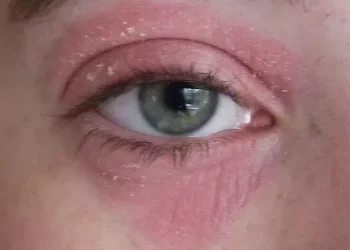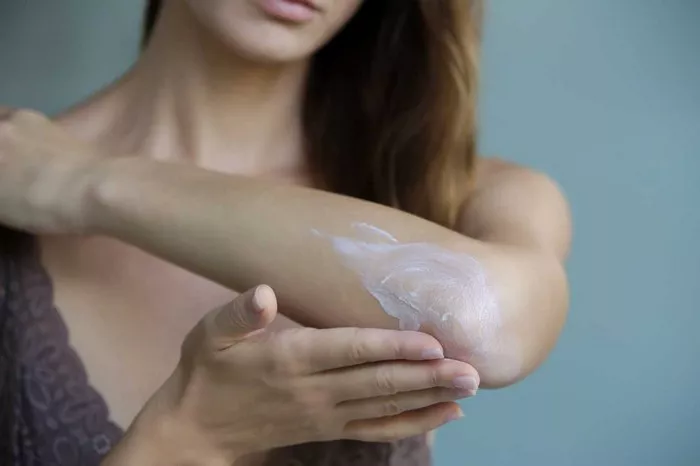Eczema, a chronic inflammatory skin disorder, affects millions worldwide, presenting with itchy, red, and often scaly patches on the skin. While it commonly targets areas like the elbows, knees, and hands, the question of whether it can cause lip swelling is both relevant and complex. The lips, being a sensitive and highly visible part of the face, are vulnerable to various dermatological issues. Understanding if and how eczema can lead to lip swelling is crucial for accurate diagnosis, appropriate treatment, and patient comfort. Eczema encompasses several subtypes, each with its own characteristics and propensity to involve different body regions, making it essential to explore the specific conditions under which lip swelling might occur.
Types of Eczema and Their Association with Lip Swelling
Atopic Eczema
Atopic eczema, often linked to genetic predisposition and allergies, frequently affects the face, including the lips. In individuals with atopic eczema, the skin barrier function is compromised due to a defect in proteins like filaggrin, which normally helps maintain skin hydration and protect against external irritants. When the lips are involved, they can become red, itchy, and swollen. This swelling may be a result of the body’s immune response to allergens in the environment, such as certain foods, pollen, or dust mites, which trigger inflammation in the already sensitized skin of the lips. Children with atopic eczema are especially prone to facial involvement, and lip swelling can be distressing for both them and their caregivers, potentially affecting speech and eating.
Contact Eczema
Contact eczema occurs when the skin comes into direct contact with an irritant or allergen. On the lips, this can be due to various factors. Lipsticks, lip balms with certain fragrances or preservatives, or even toothpaste ingredients can act as irritants or allergens, leading to contact eczema and subsequent lip swelling. The swelling is part of the inflammatory reaction, as the skin tries to protect itself from the offending substance. In some cases, it may start with mild redness and itching, progressing to more pronounced swelling if the exposure continues or if the individual repeatedly uses the same irritating product without realizing its role in the reaction.
Dyshidrotic Eczema
Typically affecting the hands and feet, dyshidrotic eczema can, in rare cases, also involve the lips. This form of eczema is characterized by small, itchy blisters that can coalesce and lead to swelling. The exact cause of dyshidrotic eczema on the lips is not fully understood, but it may be related to stress, changes in humidity, or an abnormal immune response in the skin. When it occurs on the lips, the blisters can cause discomfort and swelling, making it difficult for patients to eat, drink, or speak clearly, as the lips lose their normal flexibility and smoothness.
Mechanisms Behind Lip Swelling in Eczema
Inflammatory Response
The immune system plays a central role in eczema-related lip swelling. When the skin of the lips is exposed to triggers, whether allergens in atopic eczema or irritants in contact eczema, immune cells like mast cells are activated. These cells release histamine, a chemical that causes blood vessels in the area to dilate, leading to increased blood flow and fluid leakage into the surrounding tissues. This process results in swelling, redness, and often itching. The more severe the immune reaction, the more pronounced the lip swelling will be, and it can be exacerbated by scratching or further exposure to the triggering factors, creating a cycle of inflammation and discomfort.
Skin Barrier Disruption
In eczema, the skin barrier is weakened, especially in areas like the lips where the skin is thinner compared to other parts of the body. The lipid layer that normally protects the skin from external agents is compromised, allowing allergens and irritants to penetrate more easily. Once inside, they can interact with the immune system, initiating the inflammatory cascade that leads to lip swelling. Additionally, the disrupted skin barrier has difficulty retaining moisture, leading to dryness, which further irritates the skin and contributes to the swelling and discomfort of the lips.
Secondary Infections
When the skin of the lips is affected by eczema and becomes swollen, cracked, or broken due to scratching, it becomes vulnerable to secondary infections. Bacteria, fungi, or viruses can colonize the damaged skin, leading to additional inflammation and worsening of the swelling. For example, the herpes simplex virus can reactivate in areas of eczema on the lips, causing cold sores that add to the existing swelling and pain, complicating the clinical picture and making treatment more challenging.
Clinical Manifestations and Diagnosis
Visual Signs
The appearance of the lips in eczema-related swelling can vary. They may be diffusely red, with a shiny or slightly scaly surface depending on the stage of eczema. In cases of contact eczema, there may be a well-defined border corresponding to the area of contact with the irritant or allergen. Blisters, as seen in dyshidrotic eczema, can be present, either as individual vesicles or grouped together, and may ooze fluid when they rupture. The degree of swelling can range from mild, with just a slight puffiness, to severe, where the lips are significantly enlarged and distorted, affecting facial symmetry and normal lip function.
Patient Symptoms
Patients with eczema-induced lip swelling often report intense itching, which can be maddening and lead to involuntary scratching, further aggravating the condition. Burning sensations are also common, especially when the skin is dry or irritated by external factors. Difficulty in speaking, eating, and drinking due to the altered shape and sensitivity of the lips is frequently noted. In addition, patients may feel self-conscious about their appearance, which can impact their social and emotional well-being, highlighting the importance of prompt and effective treatment.
Diagnostic Approaches
Diagnosing eczema as the cause of lip swelling involves a comprehensive medical history, taking into account any known allergies, recent exposures to potential irritants, and a family history of eczema or other skin conditions. Physical examination of the lips and the surrounding skin is crucial, looking for characteristic signs of eczema such as redness, scaling, and blisters. Patch testing may be performed in cases of suspected contact eczema to identify the specific allergen or irritant responsible for the reaction. Blood tests, although not always necessary, can sometimes be helpful in ruling out other underlying medical conditions that could mimic eczema-related lip swelling, such as autoimmune disorders.
Treatment Options for Eczema-Related Lip Swelling
Topical Treatments
Moisturizers are the first line of defense for eczema on the lips. Lip balms or ointments containing ingredients like glycerin, ceramides, or petrolatum help to restore the skin barrier, lock in moisture, and reduce dryness and itching. Corticosteroid creams, of low to moderate potency depending on the severity of the swelling, can be applied to reduce inflammation. However, they should be used with caution on the lips due to the potential for thinning of the skin and the risk of inadvertent ingestion. Calamine lotion can provide relief from itching and has a cooling effect, soothing the swollen lips, and can be applied several times a day as needed.
Oral Medications
Antihistamines are useful in managing the itching associated with eczema-induced lip swelling. Non-sedating antihistamines like loratadine or cetirizine can be taken daily to block the action of histamine and relieve the urge to scratch. In cases where the swelling is severe and accompanied by a significant inflammatory response, short-term use of oral corticosteroids, such as prednisone, may be prescribed by a healthcare provider to rapidly reduce inflammation. However, the long-term use of oral corticosteroids has potential side effects, so they are reserved for more recalcitrant cases and are carefully monitored.
Avoidance of Triggers
Identifying and eliminating the triggers is essential for treatment and prevention. For atopic eczema patients, avoiding known allergens in the environment, such as specific foods, pollen, or pet dander, can reduce flare-ups and lip swelling. In contact eczema cases, discontinuing the use of the offending product, whether it’s a lipstick, lip balm, or toothpaste, and switching to hypoallergenic alternatives is crucial. Maintaining a clean and hygienic environment around the lips, gently cleansing with a mild, fragrance-free cleanser, and protecting the lips from harsh weather conditions like wind and cold can also help in managing the condition.
Prevention Strategies for Eczema-Induced Lip Swelling
Skin Barrier Protection
Regularly applying a suitable lip balm or moisturizer, even when the lips are not visibly affected by eczema, helps to maintain a strong skin barrier. Look for products that are free from fragrances, dyes, and potential irritants, and contain ingredients that enhance the skin’s natural protection, such as shea butter or beeswax. This preventive measure reduces the likelihood of allergens and irritants penetrating the skin and triggering an eczema flare-up with associated lip swelling.
Allergy Management
For individuals with known allergies contributing to atopic eczema and lip swelling, allergy management is key. This may involve immunotherapy in some cases, where the patient is gradually exposed to increasing amounts of the allergen to desensitize the immune system. Keeping the living environment clean to reduce exposure to allergens like dust mites, using air purifiers, and washing bedding frequently in hot water can also help control allergies and prevent eczema flare-ups on the lips.
Stress Reduction
Stress is a known exacerbating factor for eczema, including on the lips. Incorporating stress reduction techniques into daily life, such as yoga, meditation, or regular physical exercise, can help modulate the immune system and reduce the likelihood of eczema flare-ups and lip swelling. Taking time to relax, engaging in hobbies, and ensuring sufficient sleep are also important aspects of stress management that can have a positive impact on the skin’s condition.
Conclusion
In conclusion, eczema can indeed cause lip swelling through various mechanisms, and understanding the different types of eczema, the underlying pathophysiology, and the appropriate treatment and prevention strategies is vital. By being vigilant about the symptoms, diagnosing accurately, and implementing a comprehensive management plan, healthcare providers can help patients with eczema-induced lip swelling find relief, improve their quality of life, and prevent future flare-ups. Patients, too, play an important role by adhering to treatment regimens and taking preventive measures to protect their sensitive lip skin from the effects of eczema.
Related topics
ADVERTISEMENT
- How to Get Rid of Eczema Around Nose
- How to Get Rid of an Eczema Flare-Up
- What Causes Welts When You Scratch?
ADVERTISEMENT
ADVERTISEMENT
Tags: Dyshidrotic Eczema



























